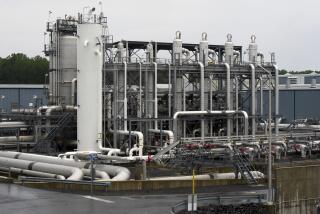Bush Advisers’ Plan Aims to Cut Foreign Oil Imports : Study Urges Tax Breaks for Gas Industry
- Share via
Two key energy advisers to President-elect George Bush on Tuesday proposed about $600 million in annual tax incentives and research outlays to boost the nation’s use of natural gas by one-third over 20 years.
Their report says the additional use of natural gas to power some automobiles, generate electricity, air-condition buildings and perform other roles could diminish the need for imported oil by about 2 million barrels a day.
Even with such increased use of natural gas, however, the nation would need imported crude oil to satisfy 66% of its needs by the year 2010, compared to 41% today. Without the actions recommended in the study to boost consumption of natural gas, the figure would be 71% in 2010, the researchers say.
“Natural gas is not a panacea,” said William F. Martin, a former deputy energy secretary and a candidate for the secretary’s post under Bush. “But clearly, gas has a larger strategic role to play than previously believed.”
The study by Washington Policy & Analysis, a consulting group, was paid for by 28 natural gas companies. The researchers came from the University of Texas, Massachusetts Institute of Technology, Princeton University and other organizations.
Martin and Scott L. Campbell, a Texas lawyer and former director of policy, planning and analysis for the Energy Department, directed the study. The two left the department last spring to join the Bush campaign.
Campbell said the recommendations do not represent energy policy under Bush, but features of the study are consistent with the Vice President’s emphasis during the campaign on expanding the role of natural gas. The study makes specific policy recommendations for the new Administration.
The study appears to suggest a more active government role in the energy area than has been the case under President Reagan. A relatively modest outlay of $100 million for research, for example, would be a big increase from current levels, said Daniel A. Dreyfus of the industry-funded Gas Research Institute.
Because it burns more cleanly than oil and there are abundant supplies in the Western Hemisphere, natural gas has long been seen as an attractive fuel to decrease U.S. reliance on Middle East oil. A recent revival of concern over the environment has made it “everybody’s favorite fuel,” according to one lobbyist.
Broader Use Impeded
Environmentalists prefer it to oil, coal and nuclear energy, while corporate overlap between the oil and gas industries has made the oil lobby a strong proponent of natural gas development.
However, unfavorable economics, blamed in part on government regulation, and the currently limited potential for natural gas to displace oil in its biggest market--as fuel for cars, trucks and planes--have impeded broader use.
In what Dreyfus called a rational but “optimistic” scenario, the study says the greatest potential growth markets for natural gas are in making electricity and powering motor vehicles.
As many as one in 20 private cars could be powered by natural gas or derivatives by the year 2010, while the use of gas as the energy source for electricity could double to supply 16% of the total, according to the study.
To meet the extra demand, the study suggests about $500 million a year in tax incentives to encourage more natural gas drilling and $100 million a year for research to help boost the amount of natural gas that could be captured from reservoirs tapped decades ago. Additional amounts of gas could also be imported from Mexico, Canada, Norway, Nigeria, Algeria and eventually Alaska, the researchers said.
Technological Help Sought
The policy actions, which the study’s authors said would generate far more federal tax revenue than they would initially cost, could increase both demand and supply in the United States by about 6 trillion cubic feet of gas by 2010 compared to what it would be under a continuation of today’s policies.
The study suggests U.S. technological help to such nations as Mexico, Venezuela, Argentina, Pakistan, Thailand, Nigeria, Indonesia and China to develop gas for export. It also proposes easing restrictions on pipeline expansion to accommodate the stepped-up flow of natural gas.
It also says that the nation should consider a “strategic gas reserve” to complement the current Strategic Petroleum Reserve, where 550 million barrels of crude are stored underground in case of a shortage.
CHANGING THE MIX
Components of the nation’s energy use in the year 2010 if today’s government policies continue.
Domestic oil: 10.4 Quads
Gas: 18 Quads
Imported oil: 26.6 Quads
Nuclear: 6.3 Quads
Coal: 29.5 Quads
Other: 4.3 Quads
Total energy use: 95.7 Quads
Increased use of natural gas would displace about 2 million barrels per day of imported oil under recommendations made by energy advisers to President-elect George Bush.
Domestic oil: 11.2 Quads
Gas: 24.8 Quads
Imported oil: 23.1 Quads
Coal: 25.6 Quads
Nuclear: 6.3 Quads
Other: 4.3 Quads
Total energy use: 95.3 Quads
*A quad is a quadrillion--1,000,000,000,000,000--British thermal units.
More to Read
Sign up for Essential California
The most important California stories and recommendations in your inbox every morning.
You may occasionally receive promotional content from the Los Angeles Times.













